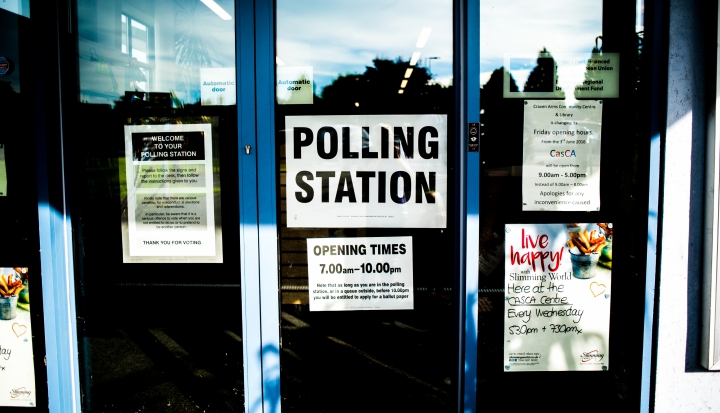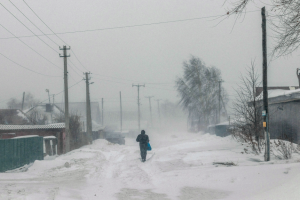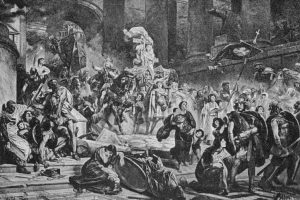The so-called Catholic vote was incredibly split after the 2016 election, and many Catholics were left struggling to understand the voting behavior of the person in the next pew.
Politics have been intertwined with religion long before 2016, but for Steven P. Millies, associate professor of public theology and director of The Bernardin Center at Catholic Theological Union, Donald Trump’s election was the catalyst he needed to begin examining the history of Catholic political involvement.
In his book, Good Intentions: A History of Catholic Voters’ Road from Roe to Trump, Millies provides an in-depth historical analysis of Catholic voting patterns over the last 50 years. Millies hopes that in understanding how Catholics have behaved politically in the past, we can begin to make sense of and move forward from our current polarized political climate.
Millies emphasizes it’s important to acknowledge that Catholics who have historically engaged with politics—regardless of their political leanings—have done so with good intentions. However, the “broader social, cultural, and political polarization has become a polarization inside the church,” he says.
“We need to promote a conversation that looks over divisions and tries to find where the gospel calls us in our daily lives,” Millies says. “We need to get past wherever those workplace, neighborhood, political, or economic commitments tug us.”
Is there such a thing as the Catholic vote?
Scholars debate this issue, but generally the consensus is no. The data tells us that Catholic voters behave, with a margin of error, more or less the same way as any other American voter. In my book I explore the mystery of how being Catholic doesn’t make a difference in voting, yet we keep talking about it because it does make a difference.
Catholic voters never stop being conscious of being Catholics who vote. It’s interesting that we have assimilated so well into American life and American culture that proportionally there’s no difference. People identify as Catholics, yet they behave strangely like Democrats and Republicans pretty consistently.
What are some milestones from the last 50 years that have affected Catholic voting patterns?
The first is Roe v. Wade in 1973. Cardinal Joseph Bernardin had a very carefully considered way of expressing himself, but if you read his statements after Roe throughout the ’70s, they are the most unnuanced things that exist in his public writings or remarks. For me, that’s a starting point to examine Catholic voting patterns because the Catholic world in the United States had a very similar reaction. It was a very unnerving and unsettling moment for American Catholics.
The next very important moment was the 1976 election. There was a tug of war between the Carter and Ford campaigns, and after meeting with both candidates Bernardin said he was encouraged by Ford and disappointed with Carter. Suddenly you’ve got the U.S. bishops taking a side in a presidential election.
The next milestone is Catholic Democrat Mario Cuomo’s 1984 speech at Notre Dame, where he said the law has to be the law for everybody, including people who don’t believe what Catholics believe. A personal, ethical, religious, and moral preference about abortion may be separate from a political, public, and lawful obligation as a public official. This is the dilemma for Americans who are Catholics and Catholics who are Americans.
The Catholic argument in voting then gets wrapped around the emerging culture wars that come out at the end of the Cold War in the early 1990s. Then a very important moment comes in 2004, where the George W. Bush reelection campaign undertakes a specific effort at what they called Catholic outreach. Evangelical-turned-Catholic Deal Hudson, a philosophy professor at Fordham University, was in charge of Catholic outreach and perceived for the first time that by putting Catholic and evangelical voters together you could really start to have an effective political force in the culture war argument.
The year 2008 is important because it is not about the culture wars but the economic crisis. The culture wars have matured, our polarizations have emerged, and our us-versus-them mentality has divided us deeply already. Catholics go to the business guy—Mitt Romney—in 2012 and again to the business guy—Donald Trump—in 2016 because now this economic anxiety has layered on top of the culture war argument.
How did abortion become the most important political issue for Catholics?
In the late summer of 1976, Father Bryan Hehir of the Harvard Kennedy School, who worked in the United States Conference of Catholic Bishops for many years, wrote in a memorandum that what the church had just done with the Carter and Ford campaigns (favoring Ford because of his view on Roe v. Wade) made us a one-issue church, and every other thing we want to do is going to be ignored.
The side of the argument that wants to restrict access to abortions is only going to hear one thing and want one thing from the church. Everybody who feels the other way about abortion is not going to listen to anything the church says about poverty, immigration, or anything else, because we’re on the other side of that one issue.
Hehir’s memorandum basically predicted the next 50 years of American Catholic political history.
Using the language of “the consistent ethic,” Cardinal Joseph Bernardin tried to be heard across a broader range of issues. The problem was that the horse was out of the barn and couldn’t get recaptured. We are still struggling to talk about politics as Catholics in a way that is not so susceptible to the partisan divide and that is not so beholden to just one issue.
There are distinctions among moral issues that need to be observed. But Bernardin’s intention was never to obliterate the distinctions. The effort was to develop a consistent perspective, an ethic that we can apply to all of these things.
He delivered a lecture at Fordham in 1983 where he articulated the consistent ethic for the first time. Unfortunately, there was a reporter there from the New York Times who in the Q&A heard Bernardin use a phrase that was not in the talk: “the seamless garment.”
This is the thing that catches on. It is the language that tends to obscure those moral differences. Seamlessness does not argue for differences. This is now the game of catch-up that the seamless garment or the consistent ethic has to play after the horse got out of the barn in 1976.
I’m encouraged by the work that we see coming from Pope Francis, Cardinal Blase Cupich of Chicago, Bishop Robert McElroy of San Diego, and others. What Pope Francis is talking about with holiness and what Cupich is talking about with solidarity is a way of reframing this ethic. It’s not really about the issues. It’s about our obligations to one another. It’s about the question of solidarity. It’s about the communal character of being Catholic and living in the world. I think that’s a positive development that’s going to, I hope, get us a little bit away from some of the baggage that came out of the ’70s and ’80s.
How did white American Catholic voters behave in the 2016 election?
The data on religious participation was not great, but in my book I look at four states after the 2016 election—Pennsylvania, Michigan, Wisconsin, and Minnesota (states that effectively delivered the race to Trump and are filled with historically Catholic populations). I looked at the counties that had the highest levels of unemployment at the peak of the economic crisis and correlated those to the ones that had the highest levels of evangelical and Catholic religious participation.
In that data you see a significant difference between Trump ’16 and Romney ’12 in those states. And the difference is significantly larger among Catholics. That centralized political effort of the United States Conference of Catholic Bishops (USCCB) and other Catholics made a difference. The decisions they made to act like lobbyists, to intrude on the political process in this way, those decisions have had consequences.
With that being said, it’s very difficult to gaze into people’s heads and really understand what happened. I grew up in a blue-collar suburb of Chicago in a parish that I’m guessing voted willingly for Trump. This is a white American immigrant Catholic experience that I’ve had and understand from the inside out.
What I can say is people do sometimes walk out of Mass rolling their eyes at Father’s homily. People get captured by things other than what Catholicism or Christianity or the gospel tells them, because that’s part of living in the world. This is part of what the church has had to struggle against every day for 2,000 years and will going forward, because the world lures us in different ways. The theological response to, “What happened in 2016?” is that sin exists.
We have integrated too much of a politically partisan spirit with what many Americans associate with being Catholic. I think that is on both sides of the partisan divide. We talk a little bit too freely about being conservative Catholics or liberal Catholics.
Since white American Catholics have found Trump to be more or less as acceptable as any other political candidate, despite everything, the time is now to ask how we feel about this path that we are pursuing.
What role did Latino Americans play in the 2016 Catholic vote?
If you look at the data, if you disaggregate white European immigrant Catholics from Latino Catholics, you see a much different picture. A much, much lower percentage of Latino Catholics voted for Trump than did white Catholics. I think there are two explanations to that. One, which is obvious and uninteresting, is that Trump said awful things about Hispanics and Latinos during his campaign.
The other explanation, which is less obvious and more interesting, is that Latino Catholics are bringing something new but, like all of us when we are born into the world or when we move to a different place, are jumping onto a moving train. From the moment they arrive here, they are no longer Catholics from Mexico or Honduras or anywhere else. They’re becoming American Catholics. They’re inheritors of our current political situation. They’re going to change it, but this is a history they have to deal with.
We have not yet reached the demographic tipping point that is inevitably coming, but what we really have to do is take stock of where we are now because this is not only the history that Latino Catholics are going to inherit, it’s also one my children are inheriting.
Historians will tell you there’s a 70-year tipping point in historical experience. If we’re talking about events that took place within the lifetime of someone you knew and were close to—basically, your grandparents and younger—then those events are real. If you are an immigrant whose immigrant experience goes back farther than that, it very quickly becomes abstract. That’s also part of why there was such a difference in white American Catholics’ and Latino American Catholics’ voting behavior in 2016.
Have Catholic bishops historically influenced Catholic voting?
Targeted political behavior among the U.S. bishops is a phenomenon of the era that I’ve written about. I cannot think of a time besides this era of abortion politics where the bishops have really been effective in influencing voting patterns.
Part of it is, again, the mystery of the Catholic voter. How much are they really listening to the guidance of the bishops or, for that matter, their pastor or the laywoman who’s the principal of the school or whoever is a Catholic leadership figure in their lives?
Yet there again, how strange it is that the bishops keep coming back over these last few decades to try to pull off what AARP can or, less flatteringly, what the NRA can: to flex their political muscle, which is a thing that, for example, in 1976, Cardinal Bernardin pretty bluntly threatened to do.
My book deals with the fact that we’re caught in this loop, because even the U.S. bishops can’t seem to disentangle themselves from thinking like partisans.
It’s very important, too, that we should understand and reflect on the fact that nobody embarked on this to do bad things. The goal was to try to make an effective argument in American public life to a non-Catholic audience about what Catholic faith tells us should be good public policy.
What is needed is not a pressure campaign or a political argument. What is needed is the conversion of points of view. It’s work that Catholics and their bishops actually ought to be pretty good at. I can’t understand why we’re acting like lobbyists, why we’re fundraising against each other, instead of just winning souls. I have heard that works.
Is it possible to be both Catholic and politically involved today?
Pope Francis talks and writes about how Christian living is inevitably political. We need to be very careful about what we mean by that, because political is not the same as partisan. In Laudato Si’ (On Care for Our Common Home) Pope Francis calls for a new kind of politics, but what he really means is an old kind of politics. He means politics in its original classical sense, which is our coming together as a community to solve our problems.
Gaudete et Exsultate (On the Call to Holiness) is a document about holiness, but it’s really a document about living together. Holiness is found in struggling with, bearing with, accompanying, and engaging with one another. All of that is done to bring about justice in the world. That’s what politics was in the way that the Greeks originally understood it.
We’ve abused that word so badly that now when something goes wrong, it’s all politics. Neighborhoods and workplaces have politics; school boards have politics. That’s a terrible abuse of an important word. Pope Francis and others, like Cardinal Cupich, are recognizing that holiness is found in recovering the real importance of that word.
What does our political future look like?
Every political scientist hates that question. It goes back to the degradation of the word politics. Politics has become only about predicting the next thing. Every bit of political media coverage is only ever about what’s going to happen next, rather than focusing on the problem we have now.
We are somehow captivated by the idea that if we win the next fight, we win and it’s over. We’ve reached the finish line, but there’s always the next election.
Obama wins, and Obama can be undone. Trump wins, and Trump can be undone, because to desire something final and decisive in politics or in life is to wish for what never can happen. If Christianity should teach us anything, it should teach us that. The world keeps going on. We’re not in control of it.
Our attention is better focused on how we can come together today, hear one another’s differences of opinion, and solve the problem we have rather than worry about the next thing that we’re never going to get. We are the greyhound chasing the rabbit. It never gets better than that. We might as well worry about now.
To some degree, on this score I think Trump has been very good because he’s become a focal point for the crisis. The crisis is not Donald Trump, the USCCB, or abortion. The crisis is us. We are the crisis. We are the problem.
It’s very bad that our politics has now resolved itself down to a finely honed binary about just one question: “What are the Republicans for? They’re for Trump. What are the Democrats against? They’re against Trump.” There are no other issues anymore. That’s our politics today. That’s the absurdity of the partisanship we have pursued. We’ve come down to this one question.
I don’t know what happens next. My hope lies in the fact that if a great and good nation has now come down to everything depending on what we think of one man, that the absurdity of that has got to shake up enough people to start a better conversation about politics.
What I worry about is that Trump will be gone before we really wake up. The day Trump is gone, whether he’s impeached or resigns or is defeated, the day he’s gone whoever comes next will seem instantly more normal. No matter who it is, whether you like that person or not, we’re all going to breathe a great sigh of relief that we’re going to be back to a more normal presidency. No matter how abnormal it actually is, we’re going to sink into relief, and the opportunity for change is going to pass us.
We have to seize what this crisis is and how clear it is today in order to begin to make an effective change.
This article also appears in the November 2018 issue of U.S. Catholic (Vol. 83, No. 11, pages 18–22).
Image: Elliott Stallion on Unsplash













Add comment